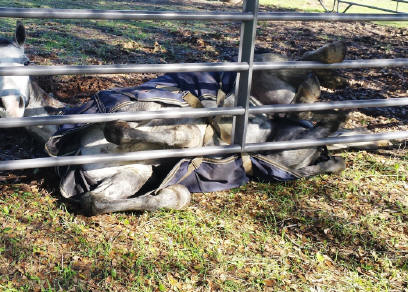Cast horse
Dr. Kimberly Brokaw, DVM
Walkersville Vet Clinic
 (8/2016) Whenever the pager goes off at midnight, I already know it's going to be a bad call. Most people are sleeping at that hour and even those that aren't, would rather not be calling their veterinarian. So when the pager went off at 11:40 pm, I already knew that it wasn't going to
be a simple call. The text simply said "owner requests sedation for her horse." When I called the owner back, it quickly became apparent that she was going to need a lot more than just sedation.
(8/2016) Whenever the pager goes off at midnight, I already know it's going to be a bad call. Most people are sleeping at that hour and even those that aren't, would rather not be calling their veterinarian. So when the pager went off at 11:40 pm, I already knew that it wasn't going to
be a simple call. The text simply said "owner requests sedation for her horse." When I called the owner back, it quickly became apparent that she was going to need a lot more than just sedation.
Earlier that evening, my client's neighbors had been shooting firearms in the backyard. While some horses are not bothered by gunfire, some become very frightened. This horse had gotten scared and had run through the three strand polywire fence. On the other side of the fence was a 5 feet deep 4 feet wide gully with a small creek running through it.
The horse had fallen into the gully and was lying on his back in the creek. As the bank was steep, the horse was unable to roll to get his legs back under him.
The horseman's term for when a horse gets stuck on his or her back is "cast". Horses can get cast in snowbanks as well as up against the side of a stall. Once cast, horses have a tendency to panic and thrash around. This can be dangerous for both the horse as well as the owner. Luckily this owner recognized the potentially dangerous situation and
called the fire department, as well as a crane, to come to her assistance.
Unfortunately the horse was cast in the gully for almost three hours before they decided it was time to call a veterinarian. In the owner's defense, I can see why I wasn't first on her list of people to call. It wasn't as if I was going to be able to lift the horse out of the creek without help. Prior to calling me, the owner had also called various
horse rescue groups who informed her that they did not do "below grade" rescues (ie they weren't trained to pull horses of out ditches).
When I arrived at the farm, I was delighted to see that the fire department had excellent lighting and had illuminated the work area well. In addition to having bright lights, they had ladders to climb in and out of the gully if needed. They also had straps to use on the horse and had already chainsawed down the trees between the horse and the crane.
However, they fireman were not familiar with horses so they didn't know how to use their equipment to get the horse safely out of the ditch.
After a brief physical exam of the horse I determined that he was cold and slightly shocky. I gave him some anti-inflammatory medication and a light sedative. I then attached the straps around the horse's barrel and had the fire department pull the horse into position to attach the crane's hoist rope. The horse was then hoisted out of the gully and
onto the nearby meadow. At that point he was still too cold and weak to stand up. However after drying him off, and then an hour of rest, the horse stood up and was calmly led back to his barn.
While not all of middle of the night emergency calls have happy endings, this one did. Thanks to a very skilled fire department, a crane, and a capable owner, this horse was successfully rescued. My presence was important, but having the proper man and machine power made it possible for the horse to be successfully pulled out of the gully and treated.
The next time our local fire department has a fundraiser, I will immediately pull out my wallet and donate. I encourage readers to do the same.
Read other articles by Dr. Kim Brokaw